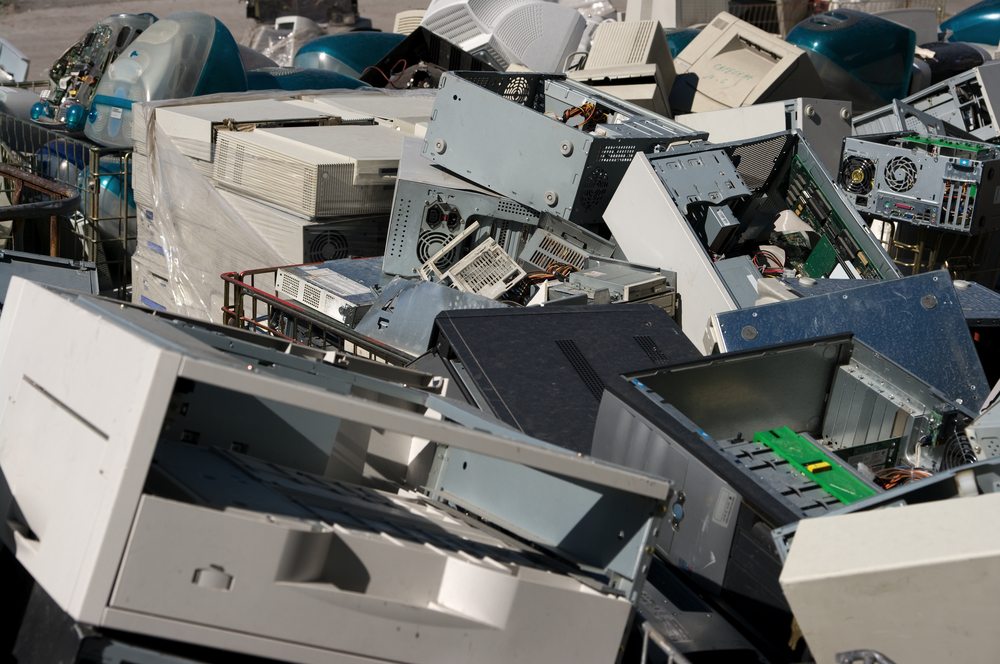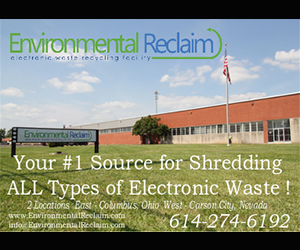
The E-Cycle Washington program reported that 93% of the materials collected in 2021 were recycled. | Huguette Roe/Shutterstock
Seven processors handled electronics under E-Cycle Washington’s program in 2021, sending recovered commodities to downstreams all around the globe.
According to E-Cycle Washington’s 2021 annual report, produced by the stewardship group Washington Materials Management and Financing Authority, about 93% of the weight of electronics collected in 2021 was recycled, while 7% was residuals such as wood, un-recyclable plastic and floor sweep.
The annual report from Washington state’s extended producer responsibility program provides details on how much material each processor handled, where they send materials after processing, who they subcontracted with, and more. The report contains a level of disclosure few other programs have.
According to the document, Ace Metal Company was the e-scrap facility paid to recycle the most pounds through the program last year, at about 3.4 million. It was followed by Metro Metals Tacoma with 3.0 million pounds, Metro Metals Vancouver with 2.8 million pounds, E-Waste with 2.2 million pounds and EWC Group with 2.0 million pounds. URT recycled about 714,000 pounds, and ERI recycled 222,000 pounds.
Insight into downstreams
The report notes where the processors shipped separated commodities around the world, and who they did business with.
All seven processing facilities reported sending material to plants in the U.S. and Japan. Ace Metal, E-Waste, EWC, Metro Metals and URT all also shipped material to Canada. Ace Metal, E-Waste, EWC, Metro Metals and ERI shipped to Korea.
Lesser-utilized destinations included China (Ace Metal and EWC); Malaysia (Ace Metal, E-Waste, EWC and URT); Belgium (E-Waste, Metro Metals and ERI); and Mexico (EWC, Metro Metals and ERI). EWC also sent materials to Hong Kong and Thailand, while ERI said it shipped to Spain, as well.
The report detailed subcontractors for the seven processors as well.
Among subcontractors, several were listed for multiple processors, including Far West Recycling in Portland, Ore.; Korea Zinc in South Korea; Lighting Resources in Indiana; Ousei Kankyoshoji in Japan; Schnitzer Steel in Washington state; QT Plastics Trading in Canada; Mitsubishi Materials Corporation in Japan; TDA/TDM/Cali Resources/Glassico in Mexico; Umicore in Belgium; and Waste Management Lamp Tracker in Arizona.
In 2021, the processors shipped out a total of 5.5 million pounds of metals, 4.7 million pounds of CRT glass, 2.2 million pounds of plastic, 1.3 million pounds of circuit boards, just under 9,700 pounds of batteries and about 3,700 pounds of mercury lamps.
Falling collection weights
Overall, E-Cycle Washington collected over 14.6 million pounds of electronics in 2021, with televisions making up the bulk of the weight. That continues the decline in poundage for the state program.
In 2020, the total weight collected was 15.2 million pounds, a steep drop from the 2019 total of 21.4 million pounds, the 25.3 million pounds in 2018 and 30.9 million pounds in 2017.
E-scrap companies processed about 12.2 million pounds of televisions, 1.7 million pounds of monitors and 1.4 million pounds of computers turned in last year. That adds to 15.3 million pounds, but the 2021 annual report said E-Cycle Washington had to make an adjustment due to a change in counting method.
Prior to 2021, the annual reports counted pounds processed in the days following the end of the calendar year. Starting in 2021, the method changed to a hard cutoff, so the total pounds verified in 2021 was reduced by 727,710 pounds.
More stories about processors
- Metallium looks to long-term contract with Glencore
- Analysis: CA climate rules set off ripple effect for thousands
- URT closes New Hampshire site, shifts work west


![ARC-Banner-300x250[1][4][3].jpg Midwest Copier Exchange - An ARCOA Group Company](https://resource-recycling.com/e-scrap/wp-content/uploads/sites/2/2021/07/ARCOA-Banner-ESN-07-19-21.jpg)
